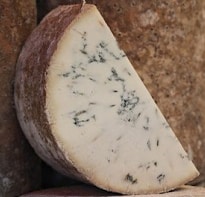Research published in British Medical Journal says halloumi and blue cheese such as Roquefort are among the worst offendersMany popular cheeses on sale in UK supermarkets contain high levels of salt, despite meeting government reduction targets as part of the drive to improve public health, campaigners have warned.Halloumi and imported blue cheese such as Roquefort contained the most salt - more than sea water - while cottage cheese contained the least, according to a major new research study carried out by Cash (Consensus Action on Salt & Health) and published in the British Medical Journal.The average salt content of cheddar - the UK's favourite - tends to be higher in branded products including Cathedral City than in supermarket own-label cheddar, while supermarkets are also better than manufacturers at reducing salt levels, the study found. Many large producers - including Dairy Crest and Kerry Foods - have not signed up to the Deparment of Health's 2012 and new 2017 salt reduction pledge.Cheese is one of the major contributors of salt to the UK diet and is widely consumed: an average person consumes nine kilos a year. But the study found that high salt intake raises blood pressure and increases the risk of cardiovascular disease (ie strokes, heart attacks and heart failure) and kidney disease.
The study - published in the online journal BMJ Open - is based on an extensive survey of 612 British and imported cheese products sold in UK supermarkets in 2012, using data on the labels to analyse the salt content (g/100g). It looked at the salt reduction targets for ten popular cheeses set by the Food Standards Agency watchdog and implemented by the Department of Health, to be achieved by 2012. While 85% (333 of the 394) of cheeses have already met their targets, 81% (318 of 394) would still get a red (which means 'high') colour rating under the so-called 'traffic light' labelling scheme.Cash called on the government to introduce much more challenging targets on salt reduction in cheese as a "cost-effective" way to improve public health and to follow the much tougher lead set by the US.At the recent World Health Assembly it was agreed that all countries should aim to cut their salt intake by 30% - aiming for a target of five grams per person per day by 2025 - while the UK recommended daily allowance is currently six grams a day. In general, salt content was high, averaging 1.7g/100g of cheese.Professor Graham MacGregor, chairman of Cash, said: "Reducing salt is one of the most cost-effective measures to reduce the number of people suffering and dying from strokes, heart attacks and heart failure. Cheese is a big contributor of salt to the UK diet and it's vital the Department of Health forces the cheese industry to implement the new targets immediately - and to set more challenging targets for the future."
In New York City the target for cheddar cheese has been set to 1.5g/100g by the end of 2014 which is already 14% lower than the new 2017 UK target (1.75g/100g).But Dr Judith Bruans, chief executive of Dairy UK, which represents the industry, said: "Salt is in an integral part of the cheesemaking process for technical and safety reasons. In an effort to provide British consumers with nutritious, safe and wholesome cheeses, the industry has made significant steps forward to reduce the salt content of dairy products over the last few years and cheese manufacturers have worked very hard to overcome technical barriers to salt reduction."
Five saltiest cheeses (grams salt per 100g)
Halloumi 2.71
Imported blue cheese 2.71Feta 2.51Other processed (eg string cheese) 2.31Edam 2.29
Five least salty
Wensleydale 1.13Emmental 1.07Mozzarella 0.75Cream cheese 0.73Cottage cheese 0.55
Blue cheeses were among some of the saltiest and branded products tend to contain more salt than supermarket own-brands. Photograph: Alamy 